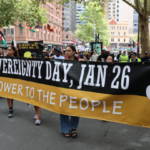Acting as a Support Person at the Police Station

When a person is arrested they have certain rights. If they are under the age of 18 or are considered vulnerable for other reasons such as a disability or intellectual impairment, a person who is under arrest is entitled to have a support person present while they are at the police station and if they are being interviewed by police.
A support person is not the same as a lawyer. A support person doesn’t provide legal advice but is there to provide physical and emotional support and help the person under arrest. They are also there to help ensure the person’s rights are being respected and they are not being taken advantage of, so having an understanding of the law and their role is extremely helpful.
As well as having a support person present, it’s a good idea for anyone who has been arrested to contact a lawyer as soon as possible.
Who can act as a support person at the police station?
If a child is under the age of 14 their support person will usually be a parent or carer or someone who is there with the permission of the child’s parent or guardian. Children over the age of 14 can nominate their own support person and this can be a friend or youth worker, or a family member.
For other vulnerable people, a support person can be a friend, family member or a worker from an advocacy organisation like the Intellectual Disability Rights Service (IDRS) which provides support for intellectually disabled people who are involved in a criminal matter.
People from a non-English speaking background also have the right to have an interpreter present during any police interviews. It’s advisable for those who do have English as a second language to take advantage of this opportunity – even if their English is reasonably good. After all, a misunderstanding or miscommunication during a police interview can have a significant impact on the outcome of a criminal matter.
Have you been asked to be a support person?
If you have been asked to act as a support person at the police station, you should be present during any interviews, questioning or searches conducted by police. If you are supporting someone under the age of 18, any evidence gathered from statements is not admissible in court unless an independent adult was present at the time. This is to ensure that the rights of the child were protected, and they weren’t coerced or misled into making a false admission of guilt.
There are a number of other duties you can fulfil as a support person at the police station and these include:
- Helping the vulnerable person find and access legal advice.
- Making sure the person you are supporting understands their rights, especially the right to silence and legal advice.
- Helping to facilitate communication between the person and police officers.
- Informing police if the person has any other issues including mental illness or intellectual disabilities.
- Contacting a friend or relative on the person’s behalf.
- Keeping an independent record of what was said during any interviews.
- Helping the person to find accommodation if necessary so they can be released on bail.
- In the case of younger offenders, encouraging police to deal with the matter under the young offenders act, instead of the court system.
- Helping the person make a formal complaint against police in situations where their rights have been violated.
As a support person, you are more than just an observer. It’s important to understand your role and be prepared to advocate for the rights of the person you are supporting if necessary. Being there as a support person can help a vulnerable adult or a child receive fair treatment and reduce the emotional distress they may be under as a result of being arrested.






